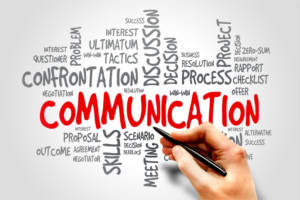Effective leadership communication is the bedrock of organizational success. Leaders who excel in communication inspire trust, foster collaboration, and drive their teams toward shared goals. However, mastering the art of leadership communication is an ongoing process that requires continuous learning, self-awareness, and strategic coaching.
In this blog, we delve into the world of Leadership Communication Coaching, exploring its significance, key components, and the transformative impact it can have on leaders and their organizations.
Contents
What Does “Leadership Communication Coaching” Mean?

“Leadership communication coaching” refers to a specialized form of coaching designed to enhance and refine the communication skills of individuals in leadership positions within organizations. This coaching focuses on developing the ability of leaders to effectively convey their ideas, inspire their teams, and navigate various communication challenges with confidence and authenticity.
The goal of leadership communication coaching is to empower leaders with the skills and strategies necessary to communicate, persuasively, and in a manner that fosters positive relationships with team members, stakeholders, and the broader organizational community.
This form of coaching recognizes the pivotal role that communication plays in effective leadership and aims to address specific communication-related challenges that leaders may encounter in their roles.
Reasons To Consider “Leadership Communication Coaching”

“Leadership communication coaching” can be a valuable investment for individuals in leadership roles and their organizations. Here are several compelling reasons to consider engaging in leadership communication coaching:
- Enhanced Leadership Effectiveness: Improved communication skills contribute to enhanced leadership effectiveness. Leaders who can articulate their vision, goals, and expectations are more likely to inspire and motivate their teams.
- Increased Team Engagement: Effective communication fosters a positive and engaging work environment. Leaders who communicate transparently and authentically build trust and rapport with their teams, leading to higher levels of engagement.
- Improved Conflict Resolution: Communication coaching equips leaders with the skills to navigate and resolve conflicts more effectively. This is essential for maintaining a harmonious work environment and preventing issues from escalating.
- Strategic Message Alignment: Leaders learn to align their messages with organizational goals and values. This ensures that communication efforts contribute to the overall strategic direction of the company.
- Crisis Preparedness: Coaching helps leaders develop effective communication strategies during times of crisis. This preparedness is crucial for maintaining stability, addressing concerns, and guiding the organization through challenging situations.
- Positive Organizational Culture: Leaders who prioritize effective communication contribute to the development of a positive organizational culture. This, in turn, attracts and retains top talent, fostering a workplace where employees feel valued and motivated.
- Increased Productivity: Clear communication minimizes misunderstandings, reducing the likelihood of errors and delays. This can lead to increased productivity and efficiency within the organization.
- Enhanced Team Collaboration: Leaders learn to foster collaboration through effective communication. This is essential for cross-functional teams, ensuring that information flows seamlessly and ideas are shared openly.
- Adaptability to Change: Effective communication is crucial during times of change. Leaders who undergo communication coaching are better equipped to communicate changes, manage resistance, and guide their teams through transitions.
Cost of Communication Leadership Coaching

The cost of leadership communication coaching can vary widely based on several factors, including the coach’s experience, reputation, the level of customization required, and the duration and format of the coaching program. Here are some factors that may influence the cost:
- Coach Expertise and Experience: Coaches with extensive experience and a proven track record may charge higher fees. Their expertise and insights can be valuable for leaders seeking top-tier coaching.
- Coaching Format: The format of coaching (e.g., one-on-one sessions, group sessions, workshops, or a combination) can impact the cost. One-on-one coaching tends to be more personalized and may be priced accordingly.
- Duration of Coaching Program: The length of the coaching program, whether it’s a short-term engagement or a more extended program, will influence the overall cost. Some coaching relationships are ongoing, while others may be more project-based.
- Customization and Tailoring: Customized coaching programs designed to address specific leadership communication challenges may involve higher costs. Tailored programs often provide more focused and impactful results.
- Additional Resources and Materials: Some coaching programs may include additional resources, materials, or assessments. These can contribute to the overall cost but may enhance the value of the coaching experience.
- Geographic Location: Coaching costs can also be influenced by the geographic location of the coach and the client. In regions with a higher cost of living, coaching rates may be adjusted accordingly.
- Frequency of Sessions: The number and frequency of coaching sessions can affect the cost. More frequent sessions or an intensive coaching schedule may require a higher investment.
- Level of the Leader: The leadership level of the individual seeking coaching can impact the cost. Coaching for executives or senior leaders may involve more complex challenges and strategic considerations.
- Follow-Up Support: Some coaching programs include follow-up support or additional resources beyond the formal coaching period. This can contribute to the overall cost but may be beneficial for ongoing development.
Conclusion
In conclusion, leadership communication coaching stands as a transformative and invaluable investment in the journey of leadership development. As the pulse of organizational success quickens in an environment shaped by constant change, effective communication has become the linchpin that holds leaders and their teams together.
Through the lens of coaching, leaders gain not only a sharpened proficiency in expressing their vision but also a profound understanding of the intricate dance that is interpersonal communication.
If you looking for leadership coaching MantraCoach is here to help. Book your free trial leadership coaching for employees session now.


